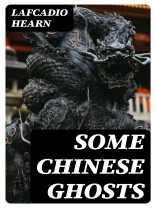In 'Some Chinese Ghosts, ’ Lafcadio Hearn delves into the rich tapestry of Chinese supernatural folklore, weaving together a collection of ghost stories that illuminate the cultural landscape of late 19th-century China. Hearn employs a lyrical and evocative prose style, blending elements of Western literary tradition with Eastern storytelling techniques to create a unique narrative experience. The work is set against a backdrop of increasing Western interest in Eastern cultures, reflecting a Western fascination with the mystical and the supernatural. Hearn’s intricate descriptions and atmospheric settings contribute significantly to the overall tone of apprehension and wonder, encouraging readers to explore the enigmatic world of spirits and the beliefs that surround them in Chinese culture. Hearn, a Greek-Irish writer and journalist, is known for his deep appreciation and understanding of Asian cultures, having spent many years in Japan and China. His experiences as a foreigner in these societies shaped his perspectives on Eastern philosophy and spirituality, enabling him to approach ghostly tales with both reverence and curiosity. 'Some Chinese Ghosts’ is a testament to Hearn’s ability to bridge cultural divides, revealing not only the stories themselves but the deeper meanings woven into them. This remarkable collection is highly recommended for readers interested in folklore, cultural studies, and the intersections between East and West. Hearn’s nuanced and empathetic interpretations of these ghostly narratives invite readers to confront the beyond while reflecting on the themes of life, death, and the spiritual world. Dive into 'Some Chinese Ghosts’ to uncover the spectral shadows that haunt human existence.
O autorze
Lafcadio Hearn (1850–1904), also known as Koizumi Yakumo after gaining Japanese citizenship, was a writer of international renown who offered Western audiences a gateway into Eastern cultures, most notably the lore and society of Japan. Hearn was born on the Greek island of Lefkada but spent his formative years in Ireland and the United Kingdom before emigrating to the United States and eventually settling in Japan. His eclectic heritage and varied experiences deeply influenced his literary style, which often reflected a blend of narrative journalism and cultural anthropology. His masterful use of language and ability to convey complex cultural nuances won him accolades as an interpreter of the Eastern psyche to the Western world. Hearn’s 'Some Chinese Ghosts’ (1887) is an early work that presaged his more famous collections of Japanese legends and tales. In this volume, he shows his keen ability to retell Chinese folklore with a lyrical and evocative prose that would become his hallmark. The book, lesser known than his subsequent works on Japan, still offers a fascinating insight into Hearn’s early engagement with Eastern motifs and his talent for capturing the ethereal quality of supernatural tales. Hearn’s contributions to cross-cultural literature remain invaluable, as he bridged the gap between East and West with his captivating stories and insightful commentaries.












